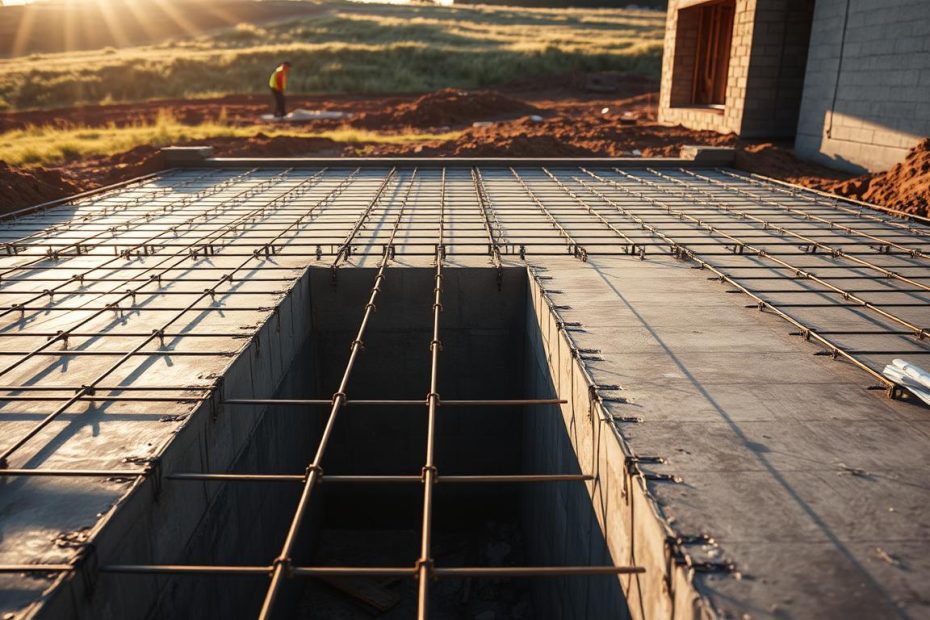When it comes to building a home, the base on which the entire structure is built is crucial. A well-constructed base ensures the stability and durability of the home, protecting it from damage caused by soil settlement, water, and other environmental factors.
We will guide you through the key options for building a strong home, helping you make an informed decision. Understanding the different types available is essential for homeowners to choose the best type for their home.
With various options available, selecting the right one is vital for the longevity of the structure. Our goal is to overview the different types and their significance in construction.
Exploring Common House Foundation Types
When building a home, one of the most critical decisions is choosing the right foundation type. The foundation is the base upon which the entire house is built, and it plays a crucial role in the structure’s stability and longevity.
Concrete Slab Foundations
Concrete slab foundations are a popular choice due to their simplicity and cost-effectiveness. They consist of a thick slab of concrete that serves as both the foundation and the floor of the home.
Benefits and Limitations
The benefits of concrete slab foundations include reduced risk of pest infestation and lower construction costs. However, they are less suitable for areas with expansive soils, which can cause the slab to crack.
Ideal Conditions for Installation
Concrete slab foundations are ideal for warm, dry climates with stable soil conditions. They are also suitable for homes with simple architectural designs.
Crawl Space Foundations
Crawl space foundations provide easy access to plumbing and electrical systems, making repairs and maintenance more manageable. They consist of a shallow space between the ground and the house.
Advantages for Homeowners
The advantages of crawl space foundations include easier access for repairs and maintenance, as well as better ventilation. This can help reduce moisture buildup and prevent issues like mold and mildew.
Potential Challenges to Consider
However, crawl space foundations can be prone to pest infestation and moisture issues if not properly maintained. Homeowners must ensure that the crawl space is well-ventilated and protected from pests.
Full Basement Foundations
Full basement foundations not only add value to a home but also provide additional living space. They require significant excavation and waterproofing measures to prevent water damage.
Added Value and Living Space
A full basement can be finished to provide extra living space, such as a home office, gym, or entertainment area. This can significantly increase the value of the home.
Construction Requirements
The construction of a full basement requires careful planning and execution, including excavation, waterproofing, and drainage systems. It’s essential to work with experienced contractors.
Pier and Beam Foundations
Pier and beam foundations are another option, particularly useful in areas with unstable soil conditions. They consist of a series of piers that support the beams and, subsequently, the house.
How to Select the Best Foundation for Your Home
The foundation of your home is its backbone, and choosing the right one involves considering various important elements. We need to assess several factors to determine the most suitable foundation type for our home.
Assessing Your Building Site and Soil Type
Assessing your building site and soil type is crucial in determining the most suitable foundation. Different soils have varying load-bearing capacities, and understanding these characteristics is essential. For instance, expansive soils may require specialized foundations to mitigate potential damage.
- Evaluate the soil type and its load-bearing capacity.
- Consider the slope and drainage of your building site.
- Assess the environmental conditions that may affect your foundation.
Evaluating Climate and Regional Factors
Climate and regional factors also play a significant role in choosing the right foundation. Areas prone to earthquakes or extreme weather conditions may require specialized foundations to ensure the home’s stability.

Balancing Budget Constraints and Long-term Value
Balancing budget constraints with long-term value is equally important. While some foundations may be more expensive upfront, they can offer significant savings and benefits over time. We should weigh the initial costs against the long-term benefits to make an informed decision.
By considering these factors, we can make an informed decision when choosing the best foundation for our home, ensuring its stability and longevity.
Essential Maintenance Tips for Durable House Foundations
Maintaining your house foundation is crucial for ensuring the longevity and durability of your home. We recommend regular inspections to identify potential issues before they become major problems. Proper drainage around your home is essential to prevent water accumulation, which can lead to foundation damage.
Monitoring your foundation for signs of water damage, such as cracks or shifts, allows you to address these issues promptly. Maintaining a consistent moisture level around the foundation can also help prevent soil settlement issues, which are a common cause of foundation problems.
By following these foundation maintenance tips, you can help extend the life of your foundation and avoid costly repairs. Regular maintenance is key to durable foundations, and we encourage homeowners to stay proactive in protecting their investment.
